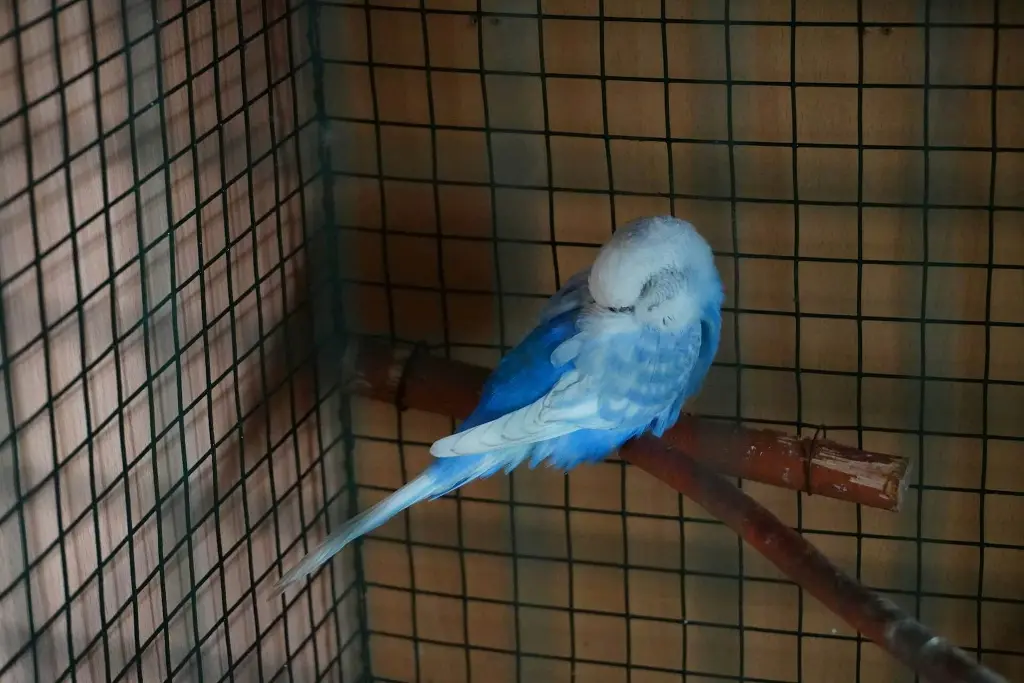Introduction
If you’ve ever wondered how much sleep your budgerigar needs or if their sleep patterns are normal, you’re not alone. Budgerigars, or budgies as they’re often called, have unique sleep habits that are important for their overall health. Just like us, these little birds need a good night’s sleep to stay happy and healthy. Understanding budgie sleep patterns and ensuring they get the rest they need can make a big difference in their well-being. In this post, we’ll dive into how much sleep budgerigars need, what affects their sleep, and how you can create the perfect environment to help your budgie get the best rest possible. Whether you’re a new budgie owner or just looking to improve your bird’s sleep routine, you’ll find plenty of helpful tips and insights here.
Understanding Budgerigar Sleep Patterns
Budgerigars have sleep patterns that might surprise you if you’re new to keeping these charming birds. Unlike humans, budgies don’t just sleep at night; they take short naps throughout the day as well. This polyphasic sleep pattern is natural for budgerigars and is something to be aware of when observing their behavior.
At night, budgerigars need around 10 to 12 hours of uninterrupted sleep. This long stretch of rest is crucial for their health and well-being. During this time, they enter a deep sleep phase that allows their bodies to recover and recharge.
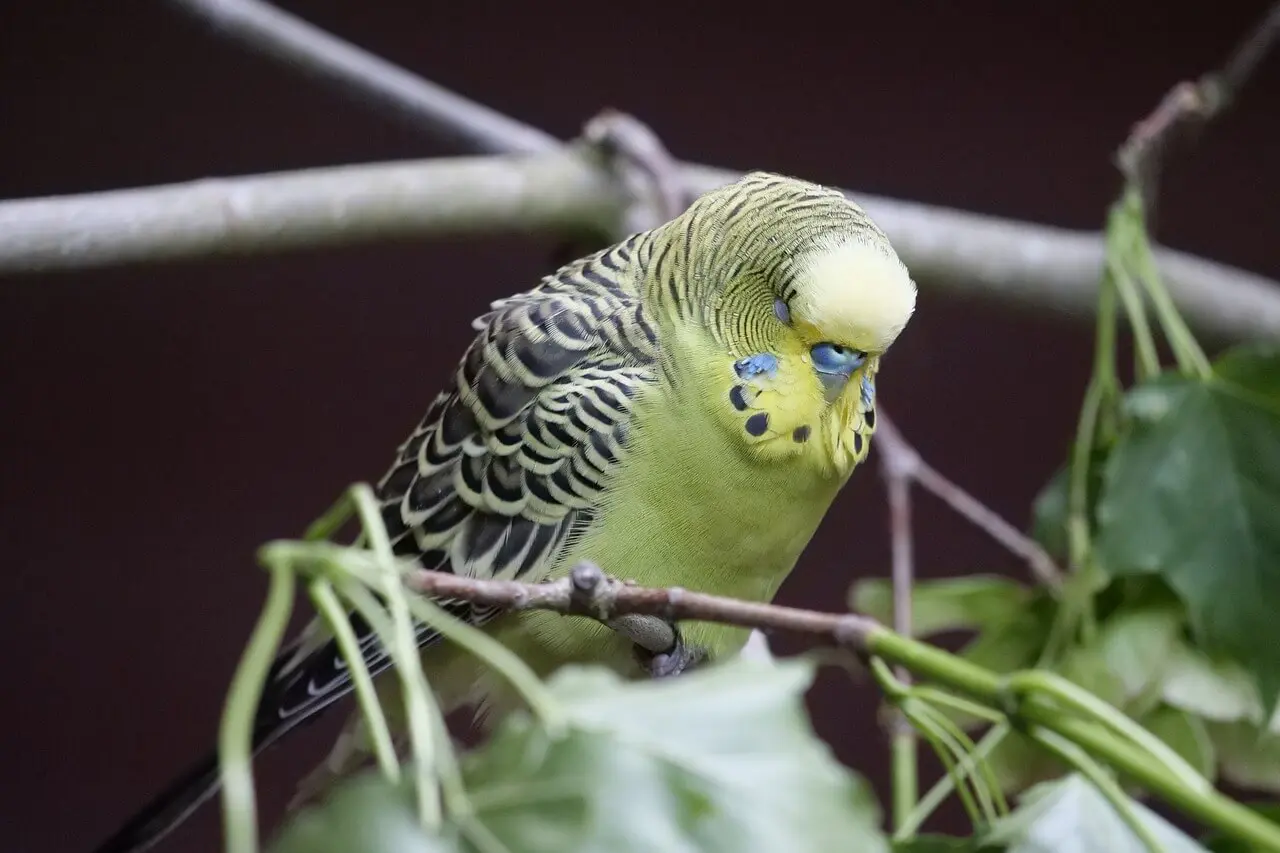
A budgerigar peacefully sleeping on a branch, highlighting the natural sleep pattern of these birds.
Budgies are sensitive to their environment, and things like light, noise, and the overall cage setup can significantly impact their sleep. For instance, too much light in the room can disrupt their sleep cycle, causing them to wake up frequently. Similarly, loud noises or sudden movements can startle them out of their rest.
Another interesting aspect of budgerigar sleep is that they often sleep with one eye open. This behavior, known as unihemispheric slow-wave sleep, allows them to stay alert to potential dangers while still getting some rest. It’s a fascinating adaptation that helps them survive in the wild, even though it’s less necessary in a safe home environment.
Understanding these sleep patterns can help you create a better sleep environment for your budgie. By recognizing their need for both daytime naps and nighttime rest, you can ensure your budgerigar stays healthy and happy.
How Much Sleep Do Budgerigars Need?
Budgerigars, like most birds, need a good amount of sleep to stay healthy and active. On average, budgies require about 10 to 12 hours of sleep each night. This might seem like a lot, but it’s essential for their physical and mental well-being. Just like humans, a lack of sleep can lead to stress, irritability, and health issues in budgerigars.
At night, your budgie should ideally be in a quiet, dark environment that mimics the natural conditions they would experience in the wild. This helps them get the deep, uninterrupted sleep they need. Ensuring they have a consistent sleep schedule is crucial, as irregular sleep patterns can disrupt their natural rhythm and lead to sleep deprivation.
In addition to their nighttime sleep, budgies also take short naps during the day. These naps are a natural part of their sleep cycle and help them recharge their energy levels. It’s common to see your budgie resting with their eyes closed or even with one eye open, which is their way of staying alert to their surroundings.
If you notice that your budgerigar seems restless or isn’t sleeping well, it’s worth checking their environment. Factors like too much light, noise, or an uncomfortable cage setup can affect their sleep. Creating a calm, peaceful space for your budgie to sleep in can make a big difference in their overall health.
By understanding and respecting your budgerigar’s sleep needs, you’ll help them live a happier and healthier life. Ensuring they get the right amount of sleep is one of the simplest yet most important things you can do for your feathered friend.
Factors Affecting Budgerigar Sleep
Several factors can influence how well your budgerigar sleeps. Understanding these can help you create a better environment for your feathered friend, ensuring they get the rest they need.
1. Light Exposure
Light plays a crucial role in regulating your budgerigar’s sleep patterns. In their natural habitat, budgies are used to waking up at sunrise and going to sleep at sunset. Excessive artificial light, especially at night, can disrupt this natural cycle and prevent your budgie from getting a good night’s sleep. To promote healthy sleep, cover their cage or dim the lights when it’s time for bed, mimicking the natural dusk environment.
2. Noise Levels
Budgerigars are sensitive to noise, and a loud or chaotic environment can keep them awake or startle them out of sleep. Household noises, such as loud TV, music, or even conversations, can disturb your budgie’s rest. Creating a quiet and peaceful area for your budgie during their sleep hours can help them sleep more soundly.
3. Cage Environment
The cage setup also significantly affects your budgie’s sleep quality. An uncomfortable perch, lack of a cozy spot to rest, or a cage that’s too close to high-traffic areas of your home can make it hard for your budgie to settle down. Ensuring that the cage is in a calm, secure location, and providing comfortable perches and a covered area for sleeping, can greatly improve your budgie’s sleep.
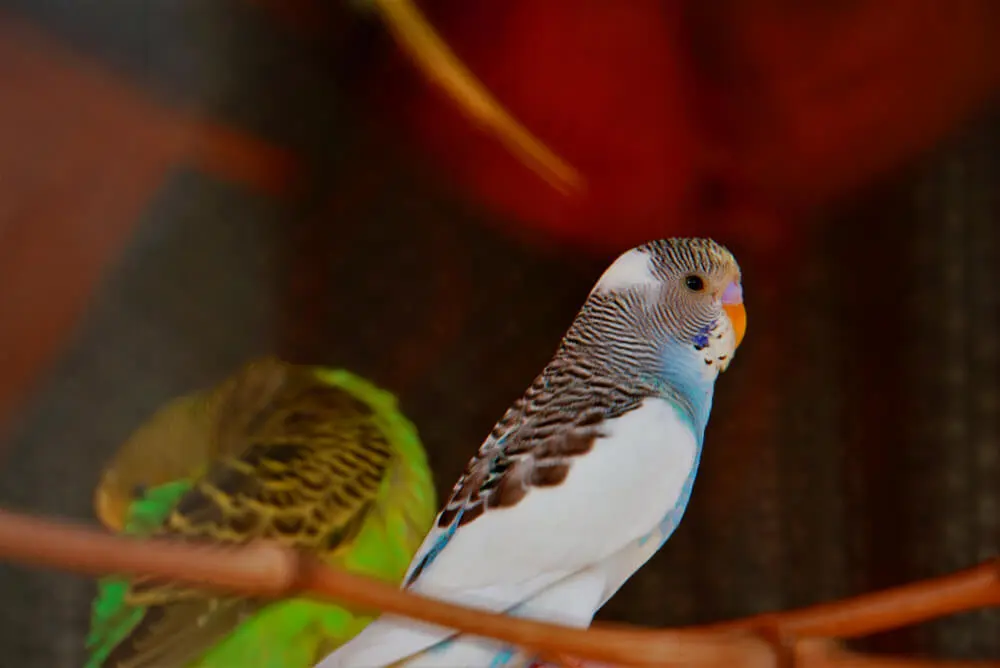
A covered bird cage at night provides an ideal environment for a budgerigar’s uninterrupted sleep.
4. Daily Routine
Consistency is key to healthy budgerigar sleep patterns. Budgies thrive on routine, so keeping a regular daily schedule for feeding, playtime, and sleep can help regulate their sleep cycle. Sudden changes in their routine or environment can cause stress and disrupt their sleep. By maintaining a predictable routine, you can help your budgie feel secure and ensure they get the sleep they need.
Understanding these factors and making small adjustments can have a big impact on your budgerigar’s sleep quality. By creating a sleep-friendly environment, you’ll help your budgie stay healthy, happy, and well-rested.
Signs of a Well-Rested Budgerigar
A well-rested budgerigar is easy to spot if you know what to look for. When your budgie is getting enough sleep, their behavior and overall demeanor will reflect their good health and well-being.
One of the first signs of a well-rested budgie is their energy level. After a good night’s sleep, your budgerigar should be active and lively during the day, engaging in play, chirping happily, and exploring their environment. If they’re alert and curious, it’s a strong indication that they’re well-rested.
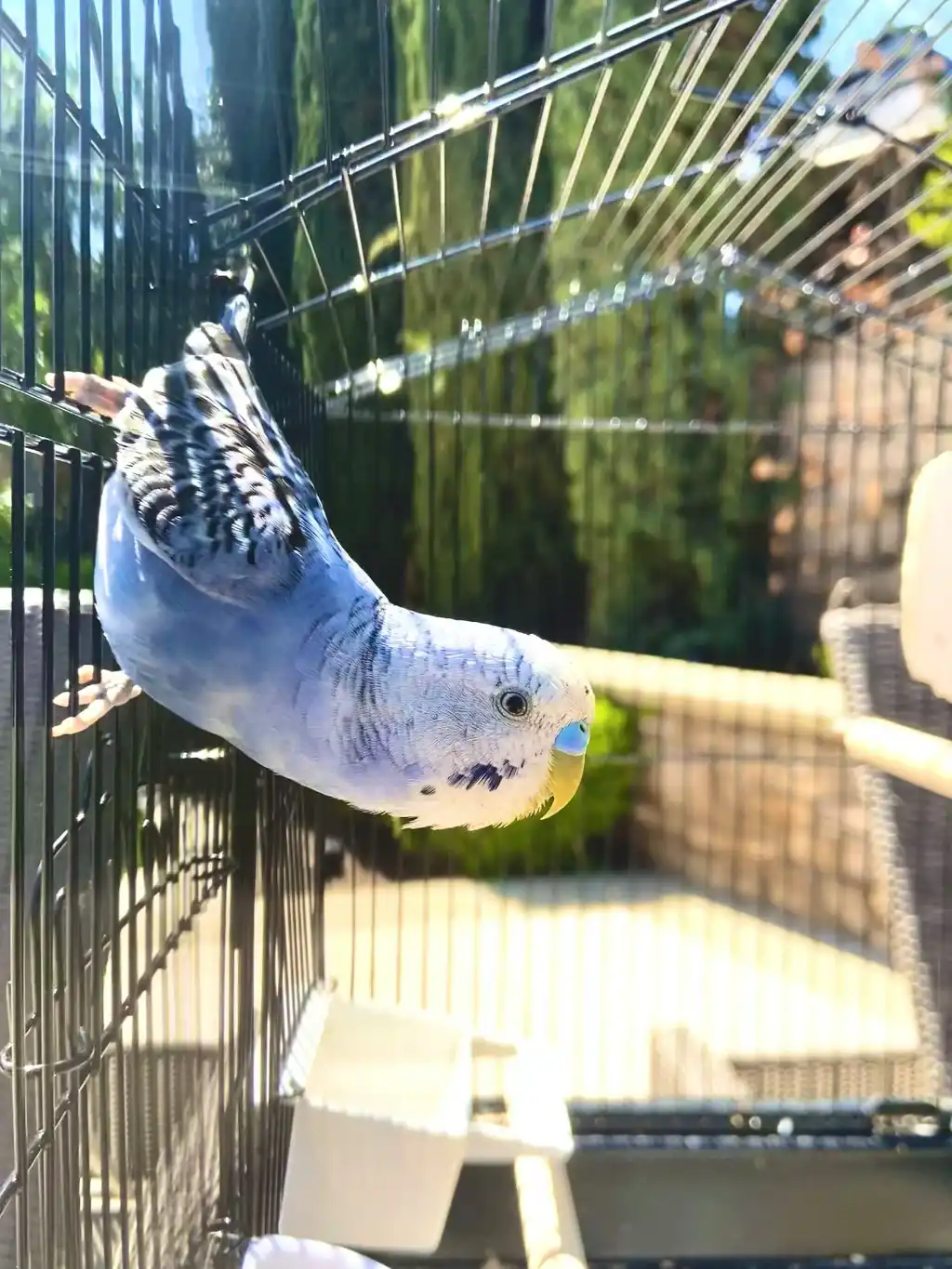
A well-rested budgerigar shows its energy by actively climbing around its cage after a good night’s sleep.
Another sign is a calm and relaxed demeanor. Budgies that get enough sleep are less likely to be irritable or aggressive. Instead, they’ll display more balanced behavior, being content to perch quietly when resting and more playful when active.
Healthy plumage is also a sign that your budgie is well-rested. A well-slept budgie will have smooth, vibrant feathers. Poor sleep can sometimes lead to stress, which may cause feather plucking or dull-looking plumage.
You might also notice that a well-rested budgie has a strong appetite. Budgies that are well-rested will eat regularly and show interest in their food. A lack of sleep, on the other hand, can lead to changes in eating habits, either eating too little or becoming picky.
Lastly, regular, short naps during the day can also be a good sign. These naps are a natural part of their sleep cycle and help them recharge throughout the day. A budgie that feels secure in their environment will take these naps without hesitation.
By keeping an eye on these signs, you can ensure your budgerigar is getting the sleep they need to stay healthy and happy. If your budgie shows these signs, it’s a good indication that you’re providing the right environment and routine to support their sleep needs.
Common Sleep Issues in Budgerigars and How to Address Them
Just like us, budgerigars can experience sleep issues that affect their overall well-being. Understanding these common sleep problems and knowing how to address them can help ensure your budgie stays healthy and happy.
1. Night Frights
One of the most common sleep issues in budgerigars is night frights. These are sudden episodes where your budgie becomes startled in the middle of the night, flapping their wings and making noise. Night frights can be triggered by sudden changes in light, loud noises, or even shadows that appear in the room. To address this, ensure your budgie’s sleeping area is dark, quiet, and free from sudden disturbances. A night light might help reduce their anxiety if they are prone to night frights.
2. Interrupted Sleep
Budgies are sensitive to their environment, and their sleep can be easily interrupted by noise or light. If your budgie isn’t getting uninterrupted sleep, they may become irritable or lethargic. To help your budgie sleep better, place their cage in a quiet part of the house and use a cage cover to block out light and noise during their sleeping hours.
3. Over-sleeping or Under-sleeping
If your budgie is sleeping too much or too little, it could be a sign of an underlying health issue or stress. Over-sleeping might indicate that your budgie is bored, depressed, or unwell, while under-sleeping can be a result of an uncomfortable environment or anxiety. Monitoring your budgie’s sleep patterns and consulting with a vet if you notice any drastic changes can help you address the issue early.
4. Sleep Aggression
Sometimes, budgerigars can become aggressive when they’re disturbed during sleep. This is often a sign that they’re not getting enough rest and are becoming frustrated. Ensuring they have a consistent sleep schedule and a comfortable environment can help reduce this aggression.
5. Difficulty Settling Down
If your budgie has trouble settling down at night, it could be due to an overstimulating environment or lack of a routine. Budgies thrive on consistency, so creating a regular bedtime routine, such as dimming the lights and covering the cage at the same time each night, can help them settle down more easily.
By recognizing these common sleep issues and taking steps to address them, you can help your budgerigar enjoy better sleep. A well-rested budgie is not only happier but also healthier, making it worth the effort to ensure they’re getting the sleep they need.
Tips for Ensuring Healthy Sleep for Your Budgerigar
Ensuring your budgerigar gets healthy sleep is essential for their overall well-being. Here are some practical tips to help you create the ideal sleep environment and routine for your feathered friend.
1. Create a Comfortable Sleep Environment
Your budgie’s cage should be a peaceful sanctuary where they feel safe and secure. Position the cage in a quiet part of your home, away from any drafts, direct sunlight, or high-traffic areas. Providing a comfortable perch for your budgie to sleep on, preferably one that is slightly elevated, will help them feel secure. You might also consider adding a soft cover over the cage at night to mimic the darkness of their natural habitat, helping them settle down for sleep.
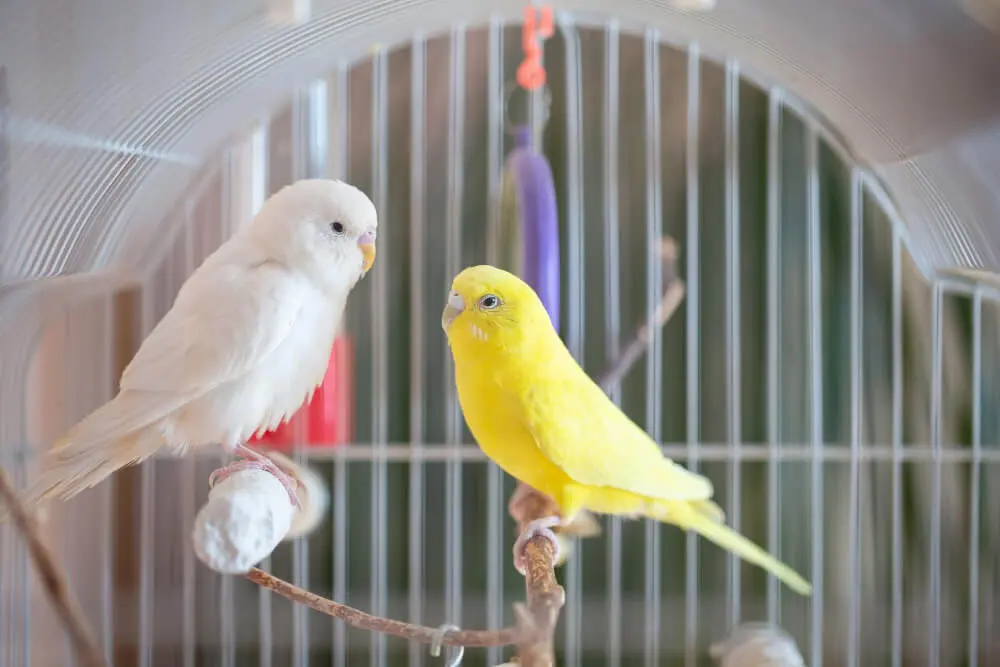
A well-organized bird cage with perches and toys ensures a comfortable environment for your budgerigar’s rest and play.
2. Establish a Consistent Sleep Routine
Budgerigars thrive on routine, and a consistent sleep schedule is crucial for their health. Aim to provide your budgie with 10 to 12 hours of uninterrupted sleep each night. Establish a regular bedtime by covering the cage and dimming the lights around the same time every evening. This consistency will help regulate your budgie’s internal clock, making it easier for them to settle down and get the rest they need.
3. Manage Noise and Light Exposure
Excessive noise and light can easily disrupt your budgie’s sleep. To create a calming environment, keep the noise levels low around your budgie’s sleeping area, especially during their sleep hours. If your home tends to be noisy at night, using a white noise machine can help mask sudden sounds that might startle your budgie. Additionally, controlling the light exposure by covering the cage at night will help signal to your budgie that it’s time to sleep, reducing the chances of interrupted rest.
4. Monitor and Adjust the Temperature
Budgerigars are sensitive to temperature changes, and extreme temperatures can affect their sleep. Ensure the room where your budgie sleeps is kept at a comfortable temperature, ideally between 65-75°F (18-24°C). Avoid placing the cage near windows, heaters, or air conditioning vents where temperature fluctuations might occur.
5. Reduce Stress and Anxiety
A calm and stress-free budgie is more likely to enjoy restful sleep. Minimize stress by handling your budgie gently, maintaining a consistent routine, and providing plenty of mental and physical stimulation during the day. A happy, content budgie will be more likely to settle down for a good night’s sleep.
By following these tips, you can create a sleep-friendly environment for your budgerigar, ensuring they get the healthy sleep they need to thrive. A well-rested budgie is not only more active and engaged but also healthier, making these small adjustments well worth the effort.
FAQs About Budgerigar Sleep
1. How many hours of sleep do budgerigars need?
Budgerigars need about 10 to 12 hours of sleep each night to stay healthy and active. In addition to their nighttime sleep, they may also take short naps during the day. Ensuring they get this amount of rest is crucial for their overall well-being.
2. Is it normal for my budgerigar to nap during the day?
Yes, it’s completely normal for budgerigars to take naps throughout the day. These short naps are a natural part of their sleep cycle and help them recharge. As long as your budgie is active and lively when awake, there’s no need to worry about their napping habits.
3. Why does my budgie sometimes sleep with one eye open?
Budgerigars can sleep with one eye open due to a behavior known as unihemispheric slow-wave sleep. This allows them to rest while still being alert to their surroundings, which is a survival mechanism in the wild. It’s a fascinating trait and perfectly normal for budgies.
4. What should I do if my budgie is having trouble sleeping?
If your budgie is having trouble sleeping, first check their environment. Ensure the cage is in a quiet, dark, and secure location. Reduce noise and light exposure, and create a consistent bedtime routine. If sleep issues persist, consider consulting a vet to rule out any health problems.
5. Can noise at night affect my budgerigar’s sleep?
Yes, loud or sudden noises at night can disrupt your budgerigar’s sleep and even cause night frights. To prevent this, keep their sleeping area as quiet as possible. If necessary, you can use a white noise machine to mask disturbing sounds and help your budgie sleep more soundly.
6. Do budgerigars need complete darkness to sleep?
While budgerigars can sleep in low light, complete darkness is ideal for ensuring they get the best quality sleep. Covering their cage at night can help block out any stray light and create a more restful environment for your budgie.
7. How can I tell if my budgie isn’t getting enough sleep?
Signs that your budgie isn’t getting enough sleep include irritability, lethargy, and a lack of interest in food or play. You might also notice changes in their behavior, such as increased aggression or excessive napping during the day. If you observe these signs, review their sleep environment and routine to make improvements.
By understanding these common questions about budgerigar sleep, you can better ensure that your budgie gets the rest they need to stay healthy and happy. If you ever have concerns about your budgie’s sleep, making small adjustments to their environment or routine can often make a big difference.
Conclusion
Ensuring your budgerigar gets enough sleep is vital for their health and happiness. By understanding budgerigar sleep patterns and knowing how much sleep they need, you can create an environment that supports their well-being. Factors like light exposure, noise levels, and a consistent routine all play a significant role in your budgie’s sleep quality.
If you notice signs that your budgie is well-rested, such as active behavior and healthy plumage, you’re on the right track. However, if sleep issues arise, simple adjustments to their environment or routine can often make a big difference.
By following the tips and advice outlined in this post, you can help your budgerigar enjoy restful, uninterrupted sleep, ensuring they wake up each day full of energy and ready to engage with you and their surroundings. A well-rested budgie is not just happier but also healthier, making your efforts to improve their sleep well worth it.

